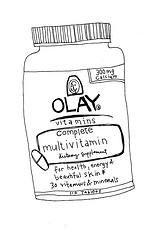 Nutrition is an essential physiological needs, which affects the health and life expectancy. With food in the human body receives more than 600 different food materials (nutrients) that have different effects on the functional state of the organism. Among them distinguish the macronutrients (proteins, fats, carbohydrates, macronutrients) and micronutrients (minerals, vitamins). A special role in the normal life body are vitamins, which are low molecular weight organic compounds with high biological activity. Vitamins are essential for the implementation of mechanisms of enzymatic catalysis, the normal metabolism, homeostasis, biochemical support of all vital body functions.
Nutrition is an essential physiological needs, which affects the health and life expectancy. With food in the human body receives more than 600 different food materials (nutrients) that have different effects on the functional state of the organism. Among them distinguish the macronutrients (proteins, fats, carbohydrates, macronutrients) and micronutrients (minerals, vitamins). A special role in the normal life body are vitamins, which are low molecular weight organic compounds with high biological activity. Vitamins are essential for the implementation of mechanisms of enzymatic catalysis, the normal metabolism, homeostasis, biochemical support of all vital body functions.
They inhibit atherogenesis, prevents the development of coronary heart disease, myocardial infarction and is not used as source of energy or plastic material. It should be noted that the majority of vitamins in the human body is not synthesized, except for vitamin K and biotin (vitamin H), or synthesized in adequate quantities (vitamins B1, B2, B6, PP, D) and therefore must come from food. The vitamin content in products is much lower than the major nutrients, and not exceed, as a rule, 10 – 100 mg/100 g of product. According to modern ideas all the vitamins are divided into water-soluble (C, B1, B2, B6, PP, B12, Sun, VZ, B5, H), fat-soluble (A, D, E, K) and vitamin-(B4, B8, U, F, P, N, B13, B15) To evaluate the saturation of the organism in any vitamin to distinguish its three states: beriberi (full depletion vitamin resources of the body), vitamin deficiencies (a sharp decline in supply of the organism by one or more vitamins), hypervitaminosis (a condition characterized by excessive administration of vitamins in the body). The absence or deficiency of vitamins in the diet leads to metabolic disorders, reduce disability and immunologic reactivity, etc. Increased psycho-emotional stress, environmental degradation, environment and quality of drinking water supply disturbance, uncontrolled use of drugs – a list of some of the factors that influence which affects the performance of public health and contributes to massive daily shortages of most vitamins in adults and children.